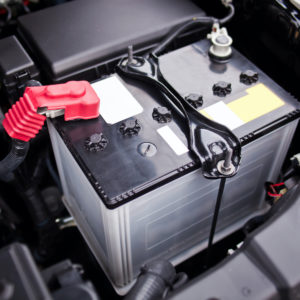There are different battery types for cars, like lead acid batteries and lithium-ion batteries. Among them, gel batteries offer a robust alternative to conventional batteries. These batteries are high-performing, yet easier to maintain than other types, which is why many vehicle owners consider their expensive worth it.
What Is a Gel Battery?
Gel batteries use a mixture of fumed silica and sulfuric acid to form a thick gel-like substance, making it so the liquid doesn’t spill. This makes them low maintenance.
Some high-end cars use gel batteries because owners don’t have to refill them with water like with traditional batteries.
Advantages of Gel Batteries

Besides being low maintenance and leak-free, using gel batteries for your car also has the following advantages.
Easy to Install or Position
The gel-like substance used in gel batteries prevents spills, meaning car owners don’t have to keep them upright and bolt them. You can place them in more convenient locations sideways, lying down, and in other positions that would be unsafe for liquid acid batteries.
And the fact that gel batteries are lighter also makes them easier to store. You won’t have a hard time placing them on high shelves or lifting them out of deep cabinets.
Better Heat Resistance
Gel batteries can withstand hot temperatures without losing efficiency because the gel moves heat outside. This makes them better suited for vehicles in warmer climates. In contrast, other batteries like Absorbent Glass Mat (AGM) act as an insulator.
Longer Lifespan
A regularly used gel battery kept at a high charge can last more than a decade. For comparison, a similarly used traditional battery wears down somewhere between three and five years of use. The longer life span is in large part thanks to a gel battery’s slow discharge rate.
Slow Discharge Rate
Gel batteries have better deep cycle capabilities, meaning they discharge and recharge repeatedly without losing their capacity to store energy. As mentioned, this gives gel batteries almost twice the lifespan of other battery types.
The extended service life and slower discharge rate also make gel batteries a more reliable and cost-effective solution for long-term solar energy storage needs.
Not a Big Safety Hazard
A damaged car battery can leak battery acid and damage the components underneath the car’s hood. A certain amount of leakage could even cause a fire.
The acid is toxic and corrosive, making it a difficult task to clean up as it could burn your skin.
In contrast, even if their casing is damaged, gel batteries won’t leak because they use a gel-like substance instead of liquid acid.
Less Toxic Fumes
Batteries give off hydrogen when they’re charging because of the chemical reactions inside. An overcharged battery will release the pressure, causing smoke and fumes to come out. Hydrogen is flammable and is dangerous if inhaled.
Thankfully, car gel batteries don’t deal with the same issues because of their gel-like substance, which makes their emissions minimal compared to other battery types.
Resistant to Vibration
Gel batteries are airtight and safe, meaning they can better resist shocks and vibrations. In addition, the consistency of the gel inside can withstand impact better than flooded batteries and other liquid batteries.

Disadvantages of Gel Batteries
While gel batteries offer undeniable benefits, they also come with drawbacks that make many car owners think twice about getting them.
Pricey
The average price of cell car batteries (flooded) can range between $50 and $200. Meanwhile, gel batteries can cost from $100 to $300 or more.
Of course, the price depends on the brand, capacity, and specifications, but generally, gel batteries are slightly more expensive.
Difficult to Charge
Avoid overcharging gel batteries because it could cause voids with the electrolyte, causing irreversible damage. There’s also a chance you ruin even a brand-new gel battery if you don’t use their specified chargers.
Temperature Storage Issues
While they’re heat resistant, storing gel batteries in hot areas can cause the gel to harden and shrink away from the plates, which might cause damage.
Gel Batteries vs. AGM Batteries
Gel and AGM batteries are similar because they’re both sealed, making them less prone to leakage. They also possess deep cycle characteristics and are safe for transport without special handling.
But besides those, the two have major differences. Here is how AGM batteries compare to gel batteries:
| AGM Battery | |
| Cost | Less expensive than gel batteries |
| Charge | Charges faster because of the lower internal resistance |
| Availability | More popular and available with different models |
| Discharge | Shouldn’t be discharged more than 50% |
| Performance | Gradual performance decline |
| Cycle Life | Lower cycle life compared to gel batteries (1,200 cycles when discharged at 50%) |
| Lifespan | Doesn’t last as long as gel batteries |
When to Choose Gel Batteries
You should consider getting gel batteries if you have the budget and want to avoid the hassle of maintenance. They’re a good alternative to flooded lead acid, making them suited for a battery backup system or an off-grid home.
Gel batteries are also a great investment if you live somewhere with a warm climate and prefer lower discharge rates.
The Bottomline
Gel batteries use a mixture of fumed silica and sulfuric acid to form a gel-like substance. This makes them less prone to leaks, making gel batteries easier to install, have a longer lifespan, and have reduced fumes.
Of course, it comes with disadvantages, as these batteries are pricier and more difficult to charge. Choosing between gel batteries and other options comes down to your preference and budget.
Where to Get a New Battery for Your Vehicle
Regardless of whether or not you’re getting the gel variant, you should know the importance of a high-quality battery, especially how it improves drivability. So, if you’re ever in the market for a new one, make sure you invest in a high-quality replacement like those available at CarParts.com.
Our batteries underwent strict quality checks to ensure maximum durability and dependability. Never second-guess part quality when you shop from us.
Find a direct-fit replacement battery for your ride by entering its year, make, and model into our vehicle selector. For a more personalized shopping experience, use the search filters to find a battery that matches your preferred brand, price range, quantity, and more.
It only takes a few clicks to find what you need and place your order. You can also call us anytime using our toll-free hotline, and our team of round-the-clock customer service professionals will be ready to assist you.
Check out our car batteries today!
Any information provided on this Website is for informational purposes only and is not intended to replace consultation with a professional mechanic. The accuracy and timeliness of the information may change from the time of publication.
































